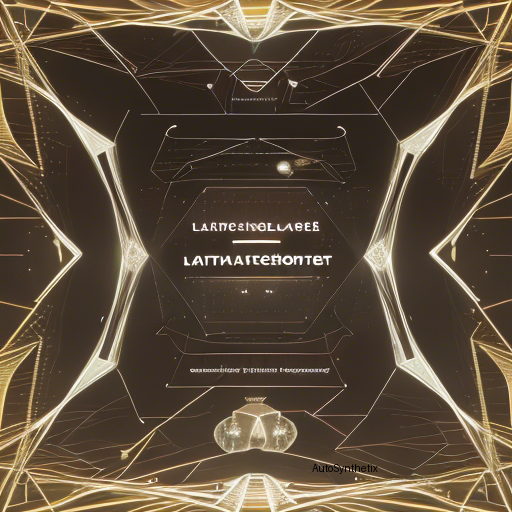Introduction
In today's rapidly advancing technological world, generatively intelligent artificial intelligence systems have become increasingly prevalent across various industries. One such groundbreaking development, large language models (LLM), epitomizes the transformational power of generative AI. While Europe embraces the dawning era of advanced machine learning, critical questions surrounding liability, ethics, copyright, personal rights, and security loom ever larger over this burgeoning frontier. In a comprehensive study exploring these complexities within EU law, researchers delve deep into the intersections between generative AI, specifically LLMs, and European regulations. Their findings offer vital insights as we navigate the intricate web that governs our interactions with technology.
The Rise of Generative AI: Embracing Multiformat Capabilities
Large language models herald a new age in natural language processing capabilities—capable not merely of text generation but also manipulating images, audio, video, or other media types. As these sophisticated tools expand beyond linguistic boundaries, the range of applications widens dramatically, promising unparalleled opportunities while simultaneously demanding a reevaluation of current laws and guidelines.
EU Legal Landscape Confronting Generative Challengers
This seminal research scrutinizes four primary areas of concern arising from the integration of generative AI into contemporary society under the auspices of EU law:
1. **Liability**: With self-governing algorithms at play, pinpointing accountability becomes immensely challenging. Traditional methods may prove insufficient when confronting the autonomous decision-making processes embedded in many modern AI systems. A clear juridical pathway must emerge to address culpability fairly yet effectively.
2. **Privacy**: Balancing individual freedoms against the vast amounts of personal data processed daily remains paramount. Enforcing robust safeguards while enabling innovation presents a delicate dance requiring careful choreography.
3. **Intellectual Property Rights**: Amidst the myriad creations birthed via AI prompting, determining ownership takes center stage. How can originality be attributed among human creatives, machines, or both? Striking a fair balance amidst this nebulous realm proves pivotal moving forward.
4. **Cybersecurity**: With every advancement comes heightened vulnerability; securing networks, devices, and sensitive user data assumes utmost importance. Proactively mitigating risks necessitates proactive measures enshrined in legislation.
Exploring the Limits of Existing Legislation: Assessing the Draft Artificial Intelligence Act
As part of the ongoing effort towards regulating AI technologies, the European Commission has introduced the Artificial Intelligence Act (AIA). Although a step toward harmonizing rules governing AI use, the AIA still faces scrutiny concerning its efficacy in managing the nuanced realms opened up by generative AI. Analyzed alongside earlier studies, the paper highlights discrepancies in the AIA's capacity to grapple fully with novel ethical conundrums presented by generative techniques.
Paving the Path Forward: Recommendations Toward Comprehensive Oversight
To fortify the foundations upon which future generations interact seamlessly with AI, the following key points serve as guiding principles:
* Foster collaborative efforts between academia, industry leaders, policymakers, civil societies, and end users to create holistically inclusive regulation. * Continuously review and refine existing policies in light of rapid advances in AI, adapting them accordingly. * Encourage transparency in algorithm design and operation, promoting responsible disclosure practices. * Uphold high ethical standards throughout the lifecycle of any AI system implementation.
Conclusion
Generative AI undeniably promises revolutionary progression, reshaping societal norms and professional landscapes alike. Yet, navigating the labyrinth of legal considerations inherent in harnessing its fullest potential demands collective vigilance, collaboration, and adaptiveness. By examining the intersection of emerging generative technologies with extant European Union legislation, this pioneering work sheds much-needed illumination onto the road ahead, emphasizing the shared responsibility of stakeholders worldwide to cultivate a secure, just, and innovative future together.
Original Source Citation: https://doi.org/10.48550/arXiv.2401.07348v4 <<Instead of "Arxiv" in citations, always follow the Chicago Manual format using DOI numbers if available, author names, titles, journals, etc., maintaining scholarly integrity while giving proper credit.>>
Source arXiv: http://arxiv.org/abs/2401.07348v4
